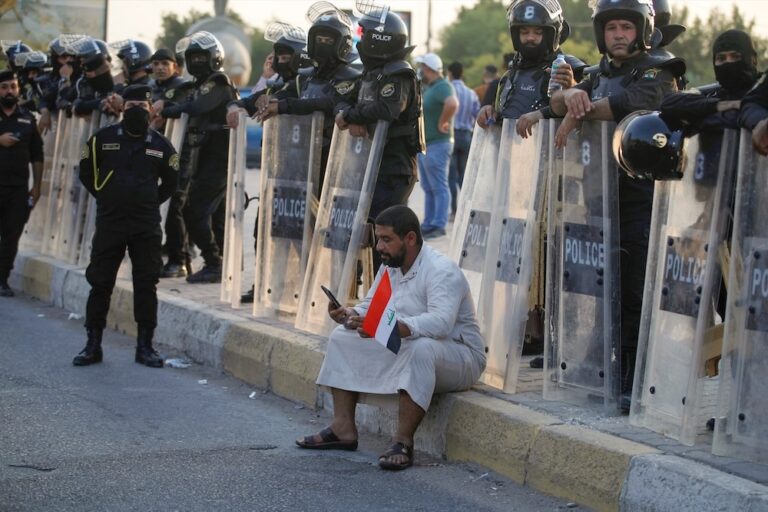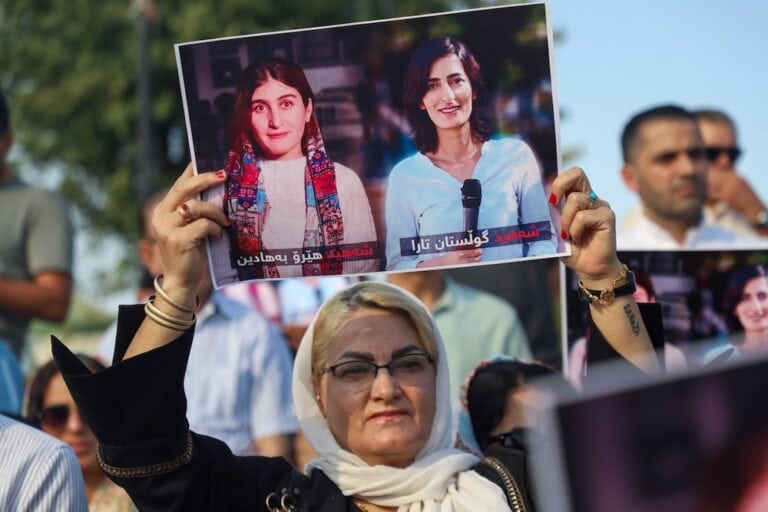Since the violence began shortly after Friday prayers on 2 December, six news media outlets have been torched and at least 15 journalists have been physically attacked or detained for questioning.
(RSF/IFEX) – 5 December 2011 – Reporters Without Borders condemns the wave of violence of the past three days in Iraqi Kurdistan in which media premises have been torched and journalists have been targeted in several of this autonomous region’s cities. The press freedom organization is alarmed by the incidents and urges the authorities to investigate all of them.
The wave of violence was set off by attacks on massage salons and shops selling alcohol in Dohuk (a city to the northeast of Erbil) after Friday prayers on 2 December. That night, buildings belonging to the opposition Kurdistan Islamic Union (KIU) and media affiliated to the party were set on fire in Dohuk. Since then, six news media outlets have been torched and at least 15 journalists have been physically attacked or detained for questioning.
That night, the premises of Speda, a KIU satellite TV station, and the local KIU radio and TV station in Zakho, a town in Dohuk province, were torched. The offices of the KIU’s student wing in Zakho were also set on fire.
The same night, security forces attacked a Speda crew while it was covering the arson attack on the KIU’s headquarters in Dohuk. Cameraman Abdullah Ahmed was roughed up and his camera was broken. The website of KNN, another opposition TV station, reported that KNN journalists were attacked in the town of Smel and their equipment was confiscated. A reporter for Naliya Radio and Television (NRT), another satellite TV station, was also physically attacked by six armed men in Smel.
According to the head of the KIU in Zakho, nine journalists working for KIU-affiliated media, including radio Xabur, were briefly detained by security forces. The journalists included Delbrin Yusef, Islam Saedi, Usama Nerdin, Delbrin Haji, Samr Ubed, Maher Sagvan and Bilal Jumha.
According to the news website Kurdiu, shots were also fired at the Speda and KNN offices in Erbil the same night.
Al-Jazeera journalist Ahmed Zawetay was filming a burning KIU building in Dohuk at around 10:30 a.m. on 3 December when he was attacked by plainclothes security men and Zeravani – members of the Kurdistan Democratic Party (KDP), one of the two ruling parties in Kurdistan. Zawetay said his camera was confiscated and several other Al-Jazeera journalists were also targeted.
Speda cameraman Murad Fouad was attacked in Dohuk and his camera was broken, while a Xabur TV cameraman was detained.
Journalists were harassed in Erbil on 3 December while covering demonstrations by KIU supporters. A reporter and a photographer working for the newspaper Xandan’s website were detained for 30 minutes by security forces. The reporter Darbaz Saleh told Kurdiu: “I was covering a demonstration along with other journalists when the police arrested me and confiscated my equipment (. . .) The police have my computer, camera, audio recorder and notebook.”
Journalists working for KNN, Speda and Somar News were physically attacked in Sulaymaniyah on 3 December while covering a peace protest against the previous night’s arson attack on the KIU’s offices.
Speda cameraman Osama Sindi was detained by security forces in the city of Dohuk yesterday. News media were forbidden to cover a fire at a massage salon in Sulaymaniyah yesterday evening. Kurdiu reporter Diyar Faruq was briefly detained in Sulaymaniyah.
NRT presenter Dildar Harki meanwhile received a threatening phone call on 3 December about an interview broadcast on 1 December in which Delbar Zebari, the vice-president of the council of Mosul province, talked about the long-standing political rivalry between the Zebari and Barzani families. In response to the widespread criticism of his comments, especially in the pro-KDP news media, NRT issued a statement saying they did not reflect the station’s editorial position.


